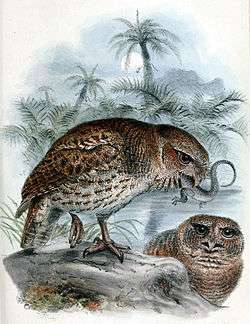Puerto Rican screech owl
| Puerto Rican screech owl | |
|---|---|
 | |
| Megascops nudipes newtoni | |
| Scientific classification | |
| Kingdom: | Animalia |
| Phylum: | Chordata |
| Subphylum: | Vertebrata |
| Class: | Aves |
| Order: | Strigiformes |
| Family: | Strigidae |
| Genus: | Megascops |
| Species: | M. nudipes |
| Binomial name | |
| Megascops nudipes Daudin, 1800 | |
| Subspecies | |
|
M. n. nudipes | |
The Puerto Rican screech owl (Megascops nudipes) or Múcaro (Spanish via Taino) is a nocturnal endemic owl of the archipelago of Puerto Rico belonging to the Megascops genus of the family Strigidae. The subspecies, M. n . newtoni, which was endemic to the Virgin Islands, was locally referred to as the cuckoo bird.
Taxonomy
The nominate form, M. n. nudipes, was originally described in 1800 by French ornithologist François Marie Daudin in Traite elementaire et complet d'Ornithologie, ou Histoire Naturelle des Oiseaux as Otus nudipes. The species name, nudipes, makes reference to its bare legs and toes which are unusual among Megascops species. The recognized subspecies, M. n. newtoni, was described in 1860 by Lawrence in the Annals of the Lyceum of Natural History and is considered extinct.[2] Furthermore, the validity of this subspecies has been questioned.[3][4]
Description
The Puerto Rican screech owl is a small owl possessing a brown upperside, a light-brown to white underside, white brown lines and white eyebrows. Sexual dimorphism is minor in this species with females being slightly larger than males. On average, males weigh 137 g and females 143 g. The species measures from 23 to 25 cm in length.
The species is common in the island of Puerto Rico but is extirpated at the nearby islands of Vieques and Culebra. As with the majority of birds in Puerto Rico it is believed to have been more abundant before the clearing of forests for agricultural development in the early 20th century. It inhabits forests with large hollowed trees such as the Caribbean National Forest.
The breeding season spans from April to June.[5] It nests in hollowed trunks and 1 or 2 eggs are deposited in each nest.
The main diet of the species consists of large insects and is complemented with small birds, geckos and small rodents.
The species calls throughout the year while hidden in thick foliage, typically at dawn. The species makes a loud coo-coo call which is the reason for its common name in the Virgin Islands.
See also
- Fauna of Puerto Rico
- List of endemic fauna of Puerto Rico
- List of Puerto Rican birds
- List of Vieques birds
- El Toro Wilderness
Footnotes
- ↑ BirdLife International (2012). "Megascops nudipes". IUCN Red List of Threatened Species. Version 2013.2. International Union for Conservation of Nature. Retrieved 26 November 2013.
- ↑ A 1995 survey in the Virgin Islands did not find any individuals.
- ↑ Biaggi, V. (1970). Editorial Universitaria; Universidad de Puerto Rico, eds. Las Aves de Puerto Rico (in Spanish). Barcelona, Spain: Manuel Pareja Publ.
- ↑ Pardieck, Keith; Myers, J; Pagan, Michelle (1996). "Surveys of Puerto Rican Screech-Owl Populations in Large-Tract and Fragmented Forest Habitats". The Wilson Bulletin. Wilson Ornithological Society. 108 (4): 776–82. Retrieved 28 March 2016.
- ↑ "The Owl Pages: Puerto Rican Screech Owl - Megascops nudipes". Retrieved May 20, 2006.
References
- Lewis, Deane, P. "Puerto Rican Screech Owl - Megascops nudipes". The Owl Pages. Retrieved April 28, 2006.
- Oberle, Mark (2003). Las aves de Puerto Rico en fotografías (in Spanish). Editorial Humanitas. ISBN 0-9650104-2-2.
